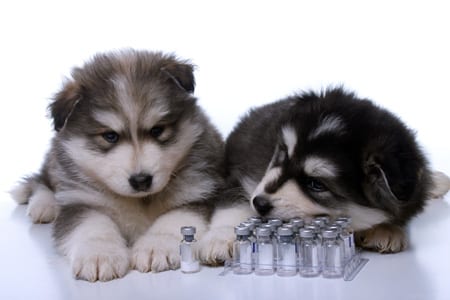 Regular vaccinations are one of the most important (and easiest) parts of preventive care that may contribute to a long, healthy life for your furbaby. With a comprehensive animal wellness program that includes an appropriate pet vaccination schedule, your dog or cat can avoid serious or life–threatening illnesses.
Regular vaccinations are one of the most important (and easiest) parts of preventive care that may contribute to a long, healthy life for your furbaby. With a comprehensive animal wellness program that includes an appropriate pet vaccination schedule, your dog or cat can avoid serious or life–threatening illnesses.
How Vaccines Work
Vaccines help prepare the body’s immune system to fight the invasion of disease-causing organisms. Vaccines contain antigens, which look like the disease-causing organism to the immune system but don’t actually cause disease. When the vaccine is introduced to the body, the immune system is mildly stimulated. Then, if your pet is ever exposed to the real disease, his or her immune system is now prepared to recognize and fight it off entirely or reduce the severity of the illness.
Types of Vaccines
There are multiple types of pet vaccinations available that protect against different types of diseases. Vaccines are considered “Core” and “Non-Core.” Core vaccines are considered vital to all dogs and cats based on risk of exposure, severity of disease, or transmissibility to humans. Non-Core vaccines are given based on a patient’s risk of exposure.
Core Vaccines – Dogs
For dogs, Core vaccines include Canine Parvovirus, Distemper, Canine Hepatitis (combined in the DA2PP vaccine) and Rabies. The DA2PP vaccine is started in puppies between 6-8 weeks of age, boostered every 3-4 weeks until the pet is 16 weeks of age, then boostered one year later. After this time, this vaccine may be given every 3 years to protect against these diseases. Rabies is started when the pet is 12 weeks of age, boostered one year later, then given every 3 years. The rabies vaccine is required by law due to the risk of transmission to humans. Canine Non-Core vaccines include Leptospirosis, Lyme Disease, and Bordetella. Your Harmony Animal Hospital Veterinarian or staff member can help you determine your dog’s risk level and if any of these vaccines are appropriate.
Core Vaccines – Cats
For Cats, Core vaccines include Feline Herpes Virus, Feline Panleukopenia, and Feline Calicivirus (combined in the FVRCP vaccine) and Rabies. The schedule for these vaccines mimics those of the DA2PP and Rabies vaccine schedules for dogs discussed previously. For kittens, the Feline Leukemia vaccine is also considered to be a Core vaccine. This vaccine is started at 10 weeks of age and boostered 3 weeks later. After this initial series, the Feline Leukemia Vaccine is given yearly only to cats considered “at risk,” making it a Non-Core vaccine. This includes cats that go outdoors or contact other cats.
Vaccine Side Effects
As with any medical procedure, there is a small chance of side effects. In most cases, the risks are much smaller than the risks of disease itself. Most pets show no ill effect from vaccination. Pet vaccination reactions may be minor and short-lived or require immediate care from a veterinarian. Clinical signs include: Fever, vomiting, diarrhea, pain/swelling/redness/scabbing/hair loss around injection site, lameness, or anaphylaxis. If you suspect your dog or cat is having a reaction to a vaccine, call us here at Harmony Animal Hospital immediately.

